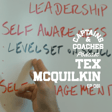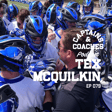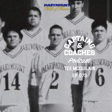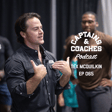Become a Creator today!Start creating today - Share your story with the world!
Start for free
00:00:00
00:00:01

003 - Arresting Leadership Insights from Law Enforcement
Trust fall! Host Tex McQuilkin interrogates Cali Hinzman, a former coach turned police officer, about the role of trust, adaptability, and servant leadership in high-stakes environments. Cali shares her beat on how lessons from coaching athletes patrol her approach to law enforcement, emphasizing the importance of building trust, leading with humility, and staying adaptable under pressure.
Whether you're a coach or a leader in any field, this episode offers bulletproof insights to help you elevate your leadership game. Don't let this one get away—tune in and lock down those leadership skills!
Training Programs:
Old Bull: https://bit.ly/old-bull-train
Captain's Speed, Strength, & Swagger: https://bit.ly/captains-train
Transcript
Introduction & Podcast Promotion
00:00:00
Speaker
Action. Welcome to the Captains and Coaches Podcast. Already two episodes in and making updates to the studio. Follow us on YouTube or Spotify or iTunes. Got videos on all those platforms. Be sure to subscribe.
Guest Introduction: Callie Hinsman
00:00:15
Speaker
I'm your host Tex McQuilkin and today I am joined by longtime friend Callie Hinsman. Callie is a nine year veteran police officer in the city of Seattle.
00:00:26
Speaker
And our relationship goes back farther than that. 15 years ago, we were training partners and coaches together in Washington, D.C. We also had the opportunity to travel the world coaching coaches, teaching people how to lift weights and run fast.
Police Officer Demands & Injury Risks
00:00:41
Speaker
Awesome experience with Cali. Most recently, together, we co-presented at the 2023 NSCA Tactical Conference in Las Vegas.
00:00:51
Speaker
where she presented the demands of a police officer and potential injury risks for first year officers. Then I took those components, those risks for injuries and presented training programs that they could adjust and certain things to look out for. And it was a great experience working together again, showing these injuries. And naturally we had to make fun with the title saying, give LEO injuries arrest.
00:01:20
Speaker
There we go.
Law Enforcement & Sport Leadership Parallels
00:01:22
Speaker
So excited to bring Callie on to talk not talk movement, but talk the parallels between law enforcement and sport leadership, especially in that entry level leader, that zero to one leader who just steps into law enforcement and what parallels coaches, team leaders, and even parents can make to help empower their future, their young athletes now, that our future leaders potential law enforcement officers and how they can prepare to take on the tasks, the responsibilities that have drastic responsibilities in not only yours, but other people's lives.
00:02:00
Speaker
This episode is brought to you by Captains & Coaches Old Bull Training Program.
Old Bull Training Program Promotion
00:02:05
Speaker
Leading by example is not optional. This is an effective, efficient, flexible training program designed to make you look the part, feel the part, so you can lead the part. For a seven-day free trial, click into the show notes and give it a shot. Now, without further ado, my pal, Callie Hinzman.
00:02:47
Speaker
Welcome to the captains and coaches podcast. I'm your host Tex McCorkin. I'm joined by my friend, longtime friend, Kelly Hinzman. Welcome to the show. Thank you. and Congratulations on the podcast and the new biz. I'm very excited for you. Yeah, we're going on an adventure. Leaders lead as I i say.
00:03:10
Speaker
so Uh, which I wanted you to be one of the first guests on the show because you've been a leader to me and taught me so much. So I want to aim to tap into those lessons. And we've had the privilege to travel the world together, work together a long time, coaching coaches. And you step into an awesome role within, uh, the police department and forces and that servant leadership that drew you there. That's where I want to begin our conversation. So.
Callie's Career Journey
00:03:41
Speaker
You've been a coach. You step into an officer role. So what drew you to that? Why are you feel that that vocation at call to become a police officer? Well, first, I'm still stuck on the fact that you think that I've taught you something, especially with regards to leadership. That's very flattering, especially coming from you, given that that is ah kind of your jam, kind of your passion. So I appreciate you saying that. That's really nice.
00:04:10
Speaker
have no idea if that's actually true, but I appreciate it. But yeah, in terms of stepping into my job, I mean, I think it was just by accident that I was drawn to it. But you know, when we worked for CrossFit Football and Power Athlete, this just seemed like when I um did a ride along and got an experience for sort of real life application of so many things that we talked about. It just seemed like a natural extension of a lot of what we discussed both you know, openly in our podcast and private conversations that we would have, things that we we're really interested in and obviously like the training aspect rolled into it. It just seemed like a natural evolution to like challenging yourself. And I think from the moment I did a ride along, I was pretty much hooked. I know you touched on the term servant leadership. I'd love to say that I was called since an early age to help people in need and
00:05:03
Speaker
you know, ah arrest bad guys and all that stuff. But I think that was just something that I fell into. And it seemed like to me, the way servant leadership kind of applied to that was just that I found something where I could really get to express all of my personal values in a very like real way. So rather than just but Not that there's anything wrong with listening to podcasts, creating podcasts or having discussions or having certain passions and training and discipline, whatever it is. I was like, well, here's a real opportunity to kind of hold yourself to that really high standard. And little did I know that the progression of police work would lead us to where it is today where the standards are so incredibly high that it's almost, you know, impossible to live up to societal standards for police work. But
00:05:56
Speaker
It still calls people to this day, new officers are still coming into the line of work. And
Servant Leadership & High Standards
00:06:01
Speaker
it just goes to show you that there is this whole, I think demographic of people who are intrigued by both servant leadership, that ability to ah ah exhibit exhibit leadership qualities through serving others, but also that are like really intrigued by living up to an impossible standard. I think there's a lot of people who do that. and you know, can be to a fault, obviously, but it's, you know, it's one of those things where it's just, it it has this allure to it. And so people want to see how how closely they can actually live to that impossible standard. So that's, you know, that's kind of how I fell into it. And it's been an extremely rewarding experience for me. I've been with the Seattle Police Department for about nine years now. And um you've seen me through it all, right? Like from the beginning, like Academy days to
00:06:52
Speaker
you know, different assignments within the department, different experiences, working with different leaders within the department and then to my current assignment. So yeah, I mean, it's in each of those capacities, I've had the ability to kind of learn from people and then, um, you know, express that learning in a very real way on the street or with other officers. And that, I mean, the team aspect You have to immediately trust the people you're working with. And that goes to say so much in the ah leadership world in sports, that trust is, it's almost implied and taken for granted. But then in yours, it is, it is not just a play where I need to trust the people next to me. It's now our lives, other people's lives and different situations that you need to get into.
00:07:43
Speaker
in line with that trust and putting your life in somebody else's hands, speak to it on that, that implication and the weight of this. And that really comes into play when it comes to leadership and then communicating to others like, Hey, trust within my words, you have my back. I got your back. What is with the implication or the assumption there?
Trust in Police Squads
00:08:08
Speaker
Man, I didn't know we were going to touch on this. This is such a good question because it's just so pertinent, right? It's this underlying foundation for everything we do. um You can't go out and do an operation or a mission or ah really anything, respond to a call if you're on patrol. If there's not this foundational trust within your direct squad mates or your unit,
00:08:32
Speaker
you know there's ah I guess the way that expresses itself is um having that time to train together, knowing that your fellow officers are also taking care of themselves mentally and physically. It's not enough to just assume. um We are put in a position in our department where training is something that I think we get to do a little bit more of than maybe your less metropolitan department. So is it a ton of training? No, I'd like more. But you actually get to see firsthand your fellow officers put in a vulnerable position ah where their training is put to the test, right? Their decision making, their
00:09:12
Speaker
Ability to deal with so stress at a high level and then having an opportunity in training. It helps to build that foundational trust when you go out on the street and the stakes are much higher and then. And the scene is so dynamic things are changing constantly i can give numerous examples of this but.
00:09:32
Speaker
It goes back to that kind of conversation we've had many times, which is falling to the level of your training. and Not to bounce around a bit, but it's also you really trust that your coworkers are but getting enough sleep, making sure that they're eating enough, making sure that they have a decent work-life balance, which is virtually impossible. You aim for whatever you aim for the stars land on the moon. It's like, you may be able to achieve these things, but these are the ongoing conversations you want to have to ensure that you can depend upon the people next to you. It also goes back to just like, yeah, I mean, I think you tend to trust people more who take care of their bodies physically. And I know that's obviously pertinent to um to ah our philosophy with just training for the task, but you want to see your fellow teammates in the gym. You want to see your squad in the gym. It gives you a chance to also just under less stress, you get a chance to have those conversations about
00:10:31
Speaker
other things and that all builds into and weaves into the fabric of trusting one another, seeing where their mindsets at. And it it plays itself out in the sense that if I'm putting together an operation, if I'm getting the sense that a coworker or a fellow officer is maybe going through something or has openly admitted to me that they're extremely tired or whatever it is, I might assign them a role that fits that capacity for their nervous system that day or whatever. Ideally, everybody switched on at all times, but the reality of the situation is that's just not true. I mean, people have lives outside of work.
00:11:09
Speaker
we spent a tremendous amount of time at work and so all of these things kind of play into having that open communication. I'm not expecting perfection from everyone at all times, but communication is key to building that trust so that we can put you in the best position to succeed, or hopefully they would put me in the best position to succeed. In my many deficiencies in police work, I would hope that when it comes game time or whatever, we're doing an operation. I'm not being put in a position that's so far beyond my capacity, you know, that I'm setting the rest of the team up for vulnerability, if that makes sense.
00:11:44
Speaker
So I think that, you know, I think that's part of that team trust. but Trust that we can keep each other and the public safe and the suspect safe. And then number two, trust that we're not going to set each each other up for some critical vulnerabilities that, you know, could also lead to significant liability.
00:12:05
Speaker
So right like, for instance, attitude, if somebody comes in and they have a terrible attitude that day, you know, or, you know, they've just been working too much or whatever, you know, it's like, you have to be cognizant of that. And maybe that's not the person that you want trying to deescalate a situation verbally with a suspect. So you just maybe like tactually remove that person and just ah say, Hey, why don't you take, take this role or whatever.
00:12:30
Speaker
but Can you go run this name, whatever it is, take them out of the situation where they could be escalating or setting everybody else up for some liability. Yeah. Yeah. And self-awareness is key. And then how I would describe it for a leader leading a team would be then the social awareness.
00:12:50
Speaker
So I'm able to pick up on those keys, those cues, those, the team members, and then make adjustments. And then this is where a mentor comes in. If you see they need a mentor moment, then you step in. If they need a space, we'll just call it space. Then we give them space and having that, then, I mean, there's certain times where in sport, we get a hell of a lot more practice reps.
00:13:17
Speaker
then then LEO officers. So then like now there's a lot more, I guess reps for that self-awareness and training the self-awareness and check-ins.
Self-awareness in Policing
00:13:29
Speaker
So people taking the initiative outside of their, their, their jobs to then really focus on self-awareness and having the, the keys, the check-in on what they need.
00:13:44
Speaker
What are some self-awareness practices, get your mind right, if you will, that you've, you've learned work specifically for you or some, some team members that you're working with. You know, our team is sort of in a fortunate position where we.
00:14:03
Speaker
just a little kind of background on the unit, but we basically have kind of two missions that we operate in. One is ah the follow-up units, the detectives of say, robbery or homicide or whatever the unit is, they'll give us a target that they're ready to have arrested. So they've developed a probable cause, they've basically determine that person's pattern of life. And they're, you know, they're like, here's everything we know about this person. Now we need you to affect the arrest. So that's part of my job. And then the other part of our job is more of like a proactive job where we go out and while we don't have targeted individuals, we have targeted crime. So there's, you know, maybe we're targeting ah narcotics one day, or maybe there's an area that there's a lot of violent crime, like carjackings and that kind of thing. So
00:14:52
Speaker
Those are kind of our two goals. And both of those roles in both of those situations, we typically split the unit up into plainclothes surveillance or undercover. And then the other unit or the other half of the unit is in like an arrest capacity or a rescue capacity. So they're uniformed. So I think with that being said,
00:15:13
Speaker
when you're kind of doing these check-ins with yourself and maybe you um are one of those people who have worked like 18 hours the day before or something crazy right and you're coming in and your nervous system might be fried maybe you're up till three or four in the morning and to me those check-ins are they're not perfect but I'm very like self-aware in the fact that okay maybe this is a day where I will volunteer to maybe be the plainclothes surveillance or something like that, where I feel like there's a less of a chance of me coming out of my role for like a life safety issue or something. And my job is, is sort of, it's less dynamic. It's more sort of observational. And is it ideal? No, you don't want to go to work on little sleep in general, right? A lot of people are still depending on you. However, the chances of you getting in, say like a physical altercation.
00:16:06
Speaker
or ah you needing to draw your weapon in a plain close capacity are are far or less, right? And so for me, that's like one of the check-ins where it's like, it's not my favorite role. I prefer to be in uniform. However, I think that the way our unit works, it's the great opportunity to kind of let people's nervous system and adrenaline come down and re-regulate from a very stressful week. So we cycle in between that role. And not only is it highly beneficial to keeping everyone safe, when you have surveillance on pretty dangerous people, you can gather so much more information and intelligence for your officers, right? You can set them up for the best possible success. But it also gives you a chance to step away. You endure stress, but you endure like a different kind of stress.
00:16:55
Speaker
And so I think that it's, that's kind of a nice embedded way where if you're doing that self-awareness check, you can, you can Roger up to do that role instead. And it's like a little less stressful on your nervous system, but other ways I, you know, check-in, I mean, I don't even, I don't have to do like cognizant check-ins because I feel like my body just tells me, I think I'm at an age now um where I just physically, I can tell if I'm You know, smash that and I will easily forfeit a workout for sleep these days. And then the other thing is just like my attitude. I think it's important for you to be in like a feedback loop that's completely open, right? Like at home with my husband and my kids, it's like.
00:17:44
Speaker
I know that if I am short with them, or if I'm, you know, not as patient, then this really helps recalibrate me recalibrate me it were into a position where I can kind of say, okay, like, even if it means taking the day off, like honestly, like taking a day off, because sometimes the hours are so long.
00:18:08
Speaker
where I feel like it's completely warranted to take time off if you need to so that you can come back in and be twice as effective, right?
Open Feedback Loop for Improvement
00:18:18
Speaker
And so that the feedback loop also within your unit, right? It goes back to that communication aspect where you have to, I personally, like I just openly tell people just,
00:18:30
Speaker
like just tell me. I have no ego in terms of like of course I have an ego but I have no ego in terms of like somebody criticizing me like for you know poor tactics or you know a poor attitude or um you know an unwillingness to work with a team or whatever just like just I'm trying not to cuss but just tell me you know just tell me if I'm If I'm deficient in one of those things, have that conversation. I'd much, much rather know than continue to just muddle through and potentially be setting up a pattern of poor performance and fatigue that is ongoing. And before you know it, it sneaks up on you. You make a bad decision and it's just catastrophic.
00:19:20
Speaker
Yeah. and And being open to that feedback is incredibly important because if one day, yeah, the wall is up. And then you give somebody a hard time for giving, you know, telling you your shoes are untied or something or yeah, your fly's open. Then. Okay. They won't give you feedback when it really matters. And then and that's why, yeah, I think that's also why, you know, and coming from the environment where we all used to work together is like, I feel like the joking and the, the ribbing, you know, there's obviously a point of diminishing returns, but it's so healthy.
00:19:56
Speaker
Because if you can if you can rib someone about casual things, things that are non-consequential, inconsequential, they really don't matter. But it shows an openness and a willingness to joke about your own faults and to accept that we are not perfect and that it's not the end of the world if your fly's open. if you you know Even if you misspeak and use the wrong word or you fumble your words during a briefing or something,
00:20:25
Speaker
And if you can, you know, there's a time to joke, there's a time to be serious. But if you can take that feedback in the moment, and I think it's very healthy, there are some people who are completely incapable of that. And those people suck. Those people are no fun to work around. They're no fun to do stressful things around. And so I think that that is what also builds tremendous cohesiveness within a unit. That's why there is so much joking in police work. There is, I mean, you need that downtime, but you're also sort of,
00:20:55
Speaker
you know It's also part of that, like again, that fabric of like building trust and building a dialogue. um like how far can i Almost like, how far can I push the joking before my like I might tell you something that I legitimately have a complaint about? you know like Did we really need to do XYZ? Did you really need to you know drive 110 miles an hour for this particular incident? you know Whatever it is. like So those conversations need to be had.
00:21:24
Speaker
So you feel the like the ribbing sets you up for the the moment to have that hard conversation? I do. I do because I just think that if you have that comfortable rapport with someone, then you're capable of, you know, I think if you have that rapport, you're capable of taking it beyond that, right?
00:21:47
Speaker
I don't know.
Handling Criticism
00:21:48
Speaker
Sorry. Tom's just bringing the baby in here for me. That's okay. No worries. Yeah. I'll, I'll buy some time. So then from a, like a sport team perspective, if we're on the topic of, of ribbon of, of talking a little trash with your team, this, this is what I would categorize as as leading an individual. So even if it may be in front of a group, it's light. So it doesn't turn into negative, but at the same time, like.
00:22:14
Speaker
We're focused individual and then nobody on the team gets away with anything. Right. Everybody, we got to make sure everybody has their moment or else. Then it turns into a but targeted attack, whether a coach intended to do that or not. And then the purpose of the ribbing there's, there's deep meaning. And one of the deep meanings is now we're preparing you and teaching you as an adult, how to act.
00:22:40
Speaker
for when their opponent across the field or the stands or whoever now starts to talk like trash in a meaningful, threatening, demeaning way. Dude, it's so true. You know how to just water off your back. So I feel like coaching freshmen, you got to go right in and start giving them a hard time. ensure that they know it's a joking way. So then if you do feel that sense, that guard, that wall go up, now I need to have a mentorship moment, even one-on-one, to ensure, hey, this is a good time. We're giving you the purpose here. Here's the deep meaning of what we're looking for. Yeah, it's also a true text. I mean, there's really no difference between what you described and what I deal with all the time.
00:23:33
Speaker
The constant criticism, the, for I'm talking about when you're dealing with the public, you know, whether it's a suspect or whatever that you're dealing with or, um you know, our unit works a lot in protests as well. And the amount of, you call it trash talking, the amount of trash talking, we'll say, the amount of hateful things from who you are as a person to, to um your appearance, to your belief system, just by looking at you. I mean, the amount of crap that is talked but to us to basically go to us into, you know, of behavior to take you out of your, you know, your performance mindset.
00:24:15
Speaker
It's incredible what people will do. And it's done on a mass scale in protest. It's done on an individual scale with certain suspects who will literally say anything. I've had people that I've dealt with tell my sergeant make claims about me to my sergeant that were completely false claims. You know, I've had suspects say really offensive things like sexual things. you you know And it's just like, I think that there is something to be said about not letting that trigger you into a tailspin. And even when people are you know trying to, if it's making a comment about your appearance or something like that,
00:24:58
Speaker
You know, if you're used to being ribbed from time to time, you can generally just laugh it off. You know, you can almost just, I mean, a human can really only take so much, but at the same time, I think it really does set you up for success when you've been, you know, sort of jokingly or, you know, mentally in a way preparing for this, like day in and day out, just dealing with some ribbing. I think there's a lot of value to it. Yeah. My last podcast, we talked a lot about perfectionism.
00:25:27
Speaker
And then how that tail spins into a performance detriment. So then the more you fight to have it perfect. And then when somebody steps in and says, whatever they're going to say, there's so many moments we see in professional sports. That's when the, the tailspin.
00:25:47
Speaker
starts. It's crippling, right? Like perfectionism is crippling in that way. And the same thing is true in police work. You know, if you had an operation that you plan to a T and something deviates from that perfection, you have to be adaptable and you have to be able to be dynamic in that situation.
Striving for Outcomes over Perfection
00:26:06
Speaker
And it's also true for like, another way you can look at that is, um you know, friend Lexi who passed away a few years ago, you know, we used to talk about like how the goal is not necessarily like winning per se, right? The goal is to get the most favorable outcome possible. So it's almost like if your goal is perfection, or even if your goal is like in police work, winning, right? If you're viewing it as I need to win this situation, I need to somehow overpower over dominate, whatever it is.
00:26:37
Speaker
It's just not going to be possible sometimes. And, you know, a winning mindset is a great thing to have. However, you can have a winning mindset, but also accept a favorable outcome, right? Like something where the situation is not perfect. Maybe you made some concessions as an officer. However, everyone's safe. ah No one got injured. um You know, you're not going to get beefed by your department. You know, you, like,
00:27:05
Speaker
It's just that's that has to be the goal. So I think that is also one of the things that is difficult for some people and athletes to transition to or athletes or um I mean, I'm making a generalization there, but, you know, people who have that background to maybe come into police work, for instance,
00:27:22
Speaker
And it's like they have a game plan. They want to quote unquote win and get that same feeling of winning, right? You have to remind them that there's a difference between that feeling of winning a game, winning a match, whatever it is, dominating your opponent versus getting the most favorable outcome for everyone, right? um And again, I want to be very clear. You don't take away your winning mindset. Your winning mindset is the same. However, winning may look differently than you expect it to look, if that makes sense.
00:27:51
Speaker
Yeah, I think athletes stepping into that perspective, that'd be a great thing to start to teach when it comes to the sport and the field, especially when the parents, the parents coming in from judging from the outside, the only thing they see win or lose in playing time. ah here They didn't see the hundred hours of practice and dynamics and opportunity and then but trusting a coach to put the right player in the right situation. So it's important then if training the athlete, if a parent is coming in on the car ride home saying something along the lines of, you know, coach this or that, or, you know, Sally's getting a lot more playing time.
00:28:38
Speaker
Okay. Well, then we don't want the kid to turn around and start to have resentment for Sally or coach. So redefining, uh, still have that winning attitude, as you said, but then favorable outcome. We still won. Yeah. Maybe I didn't get the playing time or last year we got our ass kicked by them. And now even though we lost, it was competitive.
00:29:01
Speaker
right And I made strides from the last game. So reframing different outcomes per se, rather than just the black and white W's and L's. Yeah. W's and L's points accumulation of points. There's different ways to win. There's different definitions for winning. What was everyone's experience? Did it bring the team up as a whole? Obviously you want to win the game. And I think it says a lot about leadership too, when
00:29:29
Speaker
you know, ah somebody who's in a leadership position can embrace that mindset as well. They can, in the moment, yeah they're making decisions and maybe taking on feedback in the moment that may not be what they envisioned for success or for a win per se, but they're able to take feedback in the moment from people who have, you know, who are getting new information or who have ideas in the moment. And with something, again, as dynamic as police work, you know, winning can look like so many different things. You can plan something.
00:30:03
Speaker
to the nth degree but uh you have to be so flexible with new information that's coming in or new things that you're seeing and as a leader you have to be able to take a step back and say i trust my people and what they're seeing what they're doing and we're gonna win this so to speak we're gonna we're gonna get the most favorable outcome possible but it might not look like my specific vision for how i wanted this takedown to go or how i wanted this operation to go and it's like Who cares? Who cares? It's not about you. It's about the most favorable outcome. So I think that's just kind of a ah part of that servant leadership position. Let's stick with the feedback loop to then decide favorable outcomes and then say it wasn't favorable, what tools are in place by yourself or your team to help then grow experience and prepare for the next opportunity.
Debriefing & Self-reflection
00:31:01
Speaker
Yeah, I think first and foremost, you know, at least with our team, and I think it's probably, you know, I think I'm proud to say that I think I work with a department where a lot of people are very self reflective, even if there's not a formal debrief or something like that. I think most of the people that I've interacted with over my nine years have been, they've been that type of person who wants to have, I mean, there's always the outliers, but I think the vast majority of people, they want to hear feedback. They go back into the patrol car, whatever it is, and they say, all right, how did this go down? How could we have done this better? So I think first and foremost, it kind of just starts internally, right? Like just as soon as the adrenaline
00:31:45
Speaker
comes down you're starting to kind of relive how everything played out and if there's not something glaringly obviously wrong then you you know you kind of go back and work the steps and how could I have done this better so it starts with just that mindset that personal mindset of like reflection and then I think you know there we at least our unit has in place debrief right so if once the operation is done, or whatever it is, we get together and sort of like, I would call it a formal capacity, but oftentimes it can be informal, you know, depending on, you know, if, if, if there are some things that went pretty poorly, then obviously it's much more of a somber experience. But if, you know, if everything went well, it can be like hearted, oh, you know, this was funny, or, you know, this guy answered the door completely naked, or, you know, it's like, you know, it's just
00:32:37
Speaker
You know, it can be just a funny chance to kind of just kind of come down from the experience. But yeah, debrief is extremely valuable. You know, we first talk through basically, okay, what happened? So from the very first part of the mission or whatever.
00:32:58
Speaker
we we basically talk through our roles. And so, okay, who was the first to respond? Who, where were you set up? um You know, what did you see? What decisions did you make? ah What would you, and then it evolves into after everyone's gone through what they did do, then we go back around, it's like, what would you have done differently? Or, you know, any self critiques, we'll say, like any self critiques, or we'll say,
00:33:24
Speaker
you know, what things would we maintain? What things would we improve on? You know, like what are basically what are the things that we did right? What are the things that we can improve on? And so, you know, that to me is one of the best settings. The other thing is we are living in a time and age where we have just cameras everywhere. We have cameras on our bodies, cameras on our cars, you know, there's several Instagram accounts that will scan the radios, you know, depending on what we're doing, if it's just out in the public, you know, they might respond to where we're at or maybe you're just a citizen who's around at the time who's videoing you. So there's no shortage of video feedback these days too.
00:34:05
Speaker
So if in your mind you think you did something that was so badass and then you watch a video and you look like, you know, you look amateurish or you look sort of frazzled or whatever it is, I mean, it's extremely humbling. And so you can have this verbal debrief, but then oftentimes, you know, if it's like vehicle tactics and we're, you know, maybe we're pitting a vehicle, which is basically, you know, getting it to turn around and stop a pursuit or something, or we're pinning a vehicle somewhere, so to immobilize it in a parking lot or something, you can think your vehicle tactics were like spot on or you can think that were crappy, but our reflection is not fully accurate when we're so jacked up and the stress is really high. So I think the video stuff is that game footage, it's immensely helpful to do some real reflection, some accurate reflection on not only tactics, but like ah stress level as well. How was I mentally making my decisions? What did my voice sound like?
00:35:04
Speaker
Was I taking a leadership position or was I being a good follower? Was I taking orders well in the moment? Did we work as a team when we were extracting this person from a vehicle or did it seem like nobody knew exactly what role they had or you know what I mean? So it just, again, no shortage of, and again, if you're in a unit like I am,
00:35:29
Speaker
um And then obviously even more elite elite units like SWAT and all that. I mean, the one thing that they love to do is just talk about what they did, you know? And so it just never ends. And so the self-analyzing and the team critiques, there's no shortage of that, which is, it's
Reflection & Feedback in Sports
00:35:47
Speaker
great. You don't want it to cripple you at a certain point, right? You can start to get into the minutia, but at the same time,
00:35:54
Speaker
Plus you but we have no shortage of ways to debrief and really like reflect Yeah, the One thing i'm I'm starting to see especially with working with high school college-level athletes and then professionals here and there the how a person delivers feedback to another and is how they're giving feedback about themselves or aiming to pick up on that. And if they are nasty to a teammate, well, now I'm just learning through experience that they're, that's exactly how they're speaking to themselves about themselves in their own mind. So now it's helping craft and teach them.
00:36:40
Speaker
through, through the direction of now, okay, I'm going to have them hold the mirror up. And then if they don't see the mistakes they were making. Okay. This, this is where we can start and then help them, help them, uh, start to see that what they could have done, the decisions, the tactics, pretty tactics, tactics are pretty black and white. And then.
00:37:02
Speaker
behavior. Now we can go into like a decision tree in sports anyway. I imagine it's a lot more complex in the streets. Um, but then now, okay, bringing in some, some empathy and some social awareness to that. Okay. Well, that's what you said. How do you feel that the, your teammate is going to take that? Or how do you feel they took that? And then what are the consequences down the line?
00:37:28
Speaker
And then practices the ultimate ah training environment, which we can control. So again, aiming to put kids under stress, see how they're delivering feedback to one another. And then, okay, well, we can expect the, this to be rammed, ah ramped up.
00:37:45
Speaker
during our our game competition. So it's, yeah, training and spending time with one another is so valuable so we can start to trust each other, but also see how we can deliver or take feedback from one another. Yeah. And I think before you even ah give the feedback to you, gotta you have to kind of ask yourself, but what's the goal? Before I say this, what's my goal, right? And then if the goal is,
00:38:14
Speaker
to make someone aware of maybe an opportunity for improvement, right? And to set them up for success. Well, I would hope that when you paint that picture for them, that's exactly what you're doing, right? You're not discouraging them or making them, you know, embarrassment, yeah, shame, all that stuff. It can work. However, I don't think that necessarily instills habits to want to train. I think that can be pretty detrimental for all it's going to do is, you know, for some people it can force them to want to shy away from training because it sets them up for yet another opportunity to be, to have their flaws um
Delivering Constructive Feedback
00:38:59
Speaker
exposed. Right. And so you want to make sure, I think, you know, you want to make sure that you couch your feedback in a way that is setting them up to want to
00:39:09
Speaker
improve and you know I think like a good way is just like walk me through what led you to this decision right like walk me through your mindset to make this decision so you first get to see it's not about you and what you think about their decision but first talk me through why you decided to you know drive this speed to get to XYZ or why you decided to you know you know, draw your weapon in this situation or whatever, whatever it is, right? Like walk me through that. um Or if it, you know, it could be anything room clearing or, you know, serving a warrant or something like walk me through why you decided to take this angle and not that angle. So you can at least
00:39:54
Speaker
show them that you you value kind of you know that they were still thinking about a process but you want to give them the opportunity to talk it through themselves because they might be able to in that moment realize oh shit like i have now self-discovered that i I screwed that up. but I made this decision based on some bad information or lack of experience or whatever it is. And as they're talking through it, they can say, oh, you know what? I probably shouldn't have done that because we only had two people with us or whatever.
00:40:27
Speaker
and And then, you know, I think that just instills the habit of self-reflection versus, so for me, that's kind of like the first way to go about it. And if the person is just like, yeah, I did what I did and, uh, you know, it was the right thing to do X, Y, Z, it, I'll be like, you know, well, you know, you kind of, you, you know, luckily I don't work with a ton of people like that, but you, you know, you have that opportunity to say, well, did you think about doing it this way? And, you know,
00:40:53
Speaker
it It can get contentious though. I mean, there's a lot of egos involved. This is not like a perfect scenario, right? And so it's, again, it comes back to that trust thing where one rule is that no matter what is said during the debrief, first of all, rank doesn't matter in debriefs. So if you're a sergeant or even if a lieutenant is sitting on it or you were the team leader or you were the case manager or whatever, rank does not matter.
00:41:20
Speaker
In the debrief, we are all subject to criticism and to praise and whatever. and No one should feel inhibited because there's a level of leadership there that they're not comfortable speaking openly. And so the other thing is once things are said in the debrief, it's case closed, right? Like you start a new chapter when that's over and nobody goes, you know, whether it's to lunch afterwards or home or whatever,
00:41:49
Speaker
and continues to just spool up about something that happened that was less than favorable or whatever. So we try to adhere to that as much as possible because it helps foster, I think, healthy team environment and a healthy channel of communication. There's a time and a place for it, and then there's a time and a place also to just mentally, emotionally move on. So, I mean, that's kind of our mechanism for for feedback. Yeah, those, those are two big rules um I'm going to hold on to and then establish them as, as expectations. Cause a lot of the meetings in a sport environment, they're coming quick. We got a timeout, we got a halftime, or we got a moment between practice. Cause if, if we're talking too much, we're, we're not necessarily getting our skills sharpened. So.
00:42:41
Speaker
And the big one I like there is, I like them both, but from the perspective of rank, doesn't matter. Freshman, senior, we're all here to, to, to push the program forward. So if a freshman's got something to say, let them find their voice, don't chain them down. And then once, uh, yeah, once it said case closed. So this is training them why to next play, next pitch, next opportunity.
00:43:10
Speaker
versus dwelling in the past and then a lot of the and resentment that becomes a cancer throughout the season. So over a long season, that starts to build up if you, if you don't express it or you just hold on to it. So this puts us in a position to move on.
00:43:29
Speaker
um Uh, like the feedback and then leading your team to an answer and helping them talk through it. I imagine, uh, they'll have to, and y'all are in the same level if they ever have to speak up about their decisions. Now you've helped prepare them to have that conversation and walk through that when they got to go lead up. Okay.
00:43:53
Speaker
Yeah, I think you're absolutely right. When someone's, when you ah take them back and you say, okay, well, what kind of led to this decision? Walk me through your mindset. And you do hear that. I don't know. First of all, yay for that person to say that, to admit that, right? Then giving you some BS answerable, but you know, some sort of excuse, right? But if they just said, Blaming somebody else. Yeah.
00:44:17
Speaker
Yeah, if they just said, you know, I don't really know I did what I did and it was an impulse or I did what I did and I don't really know why I chose that decision or whatever it is. First of all, that's a reflection of a healthy, I think, team environment where they feel comfortable saying that not to get too mushy, but it's huge.
00:44:37
Speaker
to me it's like applaud that like cool but now let's let's cycle back let's work back because we want to have you know that uh not to get on the all the buzz buzzwords but you want to have that intentionality for and if they're you know if you're sort of like making decisions whether it's on a team or uh um in police work and you're kind of doing them willy-nilly well uh especially in police work, that's big time problems. Big time problems if you don't have a reasoning for behind why you made every decision that you made. And so yeah, then then at least you need to have that awareness. Cycle back, okay, we need to revisit some foundational stuff, some foundational principles to
00:45:18
Speaker
whether it's uses of force in police work or foundational principles for why you decided to use a certain tool or certain tactic. um And that needs to be on the forefront of your mind. So I think i think though it's it's very rare, but also very commendable when someone says something like,
00:45:36
Speaker
you know, I don't know. And um I did it out of instinct or I did it out of just natural reaction. It's not what you want to hear, but it's also um definitely better than creating some false scenario or blaming someone else or whatever.
00:45:57
Speaker
We had a conversation last week. I want to bring up these two terms that I feel are are specific, or maybe they're not specific to police work, but I feel can start to bridge some gap in the sporting arena, but operational and then tactical leadership.
Leadership: Operational vs Tactical
00:46:12
Speaker
So how do you differentiate those two terms and then prepare your team in both sides of that coin? Well, I know when we were talking last week, you know, those terms came up, it's, yeah it could mean different things and different departments, but certainly in like, like when we're, we're having, you know, if we have a target or we have some sort of mission or an operation that we're working on, the operational leadership is kind of like the, I would say it's more of like a general oversight of, of how
00:46:47
Speaker
you know, how we're going to reach success, how we're going to achieve the goal, right? Again, like to me, it's not about winning, it's about getting the most favorable outcome. And then the tactical is like nitty gritty, like how I trust that person with, you know, everything I have, that they have the knowledge and the tools to be able to affect that outcome with tactics, right? So for us, it would be,
00:47:16
Speaker
positioning of certain officers or the timing of certain you know, certain pieces, how am I allocating my assets, right? How am I going to make this operation a success if I only have 12 people, right? Or something like that, right? So working within the skill level, the policy and the, you know, the assets, the tools that you have available to you, the number of vehicles, whatever it is. So that's going to be kind of the tactic, the tactical lead or the tactical, um you know,
00:47:50
Speaker
part of that. But the operational is, you know, are we, it is more of like a general, are we, as a team, are we maintaining the integrity of like who we are, what we do, what Seattle Police Department stands for? Are we keeping that and at the forefront of this, this mission, right? So it's, it's much more of like ah an oversee, an oversight type thing.
00:48:16
Speaker
And they're also thinking about other things, right? So, you know, the the operational lead position, they might be thinking about things that the tactical person is not a tactical person is working on.
00:48:28
Speaker
you know, the, ah again, the the nuts and bolts of it. And an operational person might be thinking, okay, if we arrest this person in this environment, how is that going to affect the arrest of the case, right? What if another potential target sees this person? And how is that going to affect subsequent arrests on, say, people who are buddies that might be, you know, doing a lot of robberies together. If we do it in this apartment complex in a way that's so, you know, visible to this other target, you know, this is just an example, but they might be thinking of more big picture type things. But you're thinking down the line too, how can we, how can we keep in mind the priorities of the Seattle Police Department or the priorities of this unit to then continue to do the work that they do, if that makes sense?
00:49:18
Speaker
The key that I wanted to bring in is that there's different levels of thinking to this. So in the, in the beginning phases of stepping into a leadership role, especially as an athlete, you only think there's one way to do things, but there, there are different modes to then take on and the expectation, especially as you go up in responsibilities.
00:49:45
Speaker
Now there's even more forms and styles and approaches and ways to to think of leadership. Yeah. And that's the beauty of, you know, that's the beauty in the allure of like, why I love my job so much is because that growth never ends, right? As soon as you think you have, and this is certainly not me, but as soon as you think you have, for instance, the tactical portion dialed in.
00:50:08
Speaker
And you've seen so many scenarios that you feel comfortable planning the tactics for varying missions, right? There's then the next echelon of goals and of, you know, but there's a next sort of understanding of what success looks like, right? ah Maybe it's more of a long-term, you know, ah case manager type position, or it's you're thinking of, you know, maybe it's just comes right down to statistics, like trying to lower the statistics of certain crime in certain geographical areas, right?
Continuous Growth in Leadership
00:50:40
Speaker
So it's like, you know, that's the beauty of it is it just never ends. And I'm, I feel incredibly fortunate that I'm surrounded by so many very, very intelligent people who are so, so good at filling those different roles.
00:50:56
Speaker
All right. So our last few questions here, we're going to be vulnerable. And I want to go back to your first, your first time leading. So think about that mindset, that approach, and then mistakes or things you overlooked or assumptions that, that were made that then led to, Oh no, there's this, this knowledge, this experience gap.
00:51:23
Speaker
that I got to think right and then make, make strides to become a better leader, like moments of accelerated development through reflection upon mistakes or assumptions that you made. Yeah. I mean, I feel like they're all the time. Um, I'm trying to think back to an early leadership position or a specific incident. Um,
00:51:53
Speaker
Did you want a specific thing? I don't know. What there, there's new, there's new leaders stepping up with, with your team exchanging and going over. So then yeah think about now you step into a mentorship role and then if, if they make a call and then maybe you have a story that then says, uh, let's rethink that or think about a parable or an experience that you would tell to help.
00:52:23
Speaker
lead them to ah more awareness. Yeah. I mean, and gosh, there's no shortage of learning curves. I would just say that probably the biggest thing that I learned was just that in terms of like leadership is again, it doesn't come down to winning. Like I think when I first came into the mindset, like when I came into police work, I had that mindset about winning and I was Like looking back, I was so egotistical. I was like so wrapped up in trying to overpower the situation. And first of all, it's just downright not possible for me in a physical way in a lot of situations. I can remember numerous times where it's just like this person is stronger than I am and it feels like they're winning. but It feels like that type of thing. So it's realizing that not only you're not gonna
00:53:24
Speaker
You can't physically and sometimes you can't verbally dominate everyone. And maybe that's a little taboo for me to say now because police culture has changed so much. But just looking back and I think realizing that You don't have to talk sense into people. You don't have to try to get them to listen to you. That's not what any of it's about. And this is, again, this is very specific to police work, but you don't have to win those conversations. And this, again, it might sound bad, but you don't have to change lives. You don't have to do any of that. but You have to take every call or every mission one by one and have the most favorable outcome possible. And so for me, that was a huge learning curve.
00:54:09
Speaker
I think I took criticism from the public very hard and realized that you're not going to be perfect. So to focus on perfection is the wrong focus. The focus is on being safe and trying to safely, whether it's affect and arrest or whatever the case is and let the chips fall where they may. You know, there was there, I can just think back. There's a lot of times where it was like,
00:54:39
Speaker
you know, getting into screaming matches with people, right? Like not healthy stuff. And, you know, realizing that none of that matters, right? Ultimately, when I show up somewhere, like I'm in charge of that situation. If it's come to me, then that means that I am now sort of like I'm leading the direction of how things go. But sometimes that means you let other people think that they have a lot more say than they do, if that makes sense. And again, that might be specific to police work. I don't know necessarily how that translates to teamwork. And it might also just be like, I had developed compensations for not being the biggest person, not having a physical presence on certain situations, like but you can make someone in a way feel like
00:55:32
Speaker
they're making some choices for yourself when really you hold all the cards in police work. Like you are, and that's the mindset you have to have is like, I know how this is going to play out. We're going to have a favorable outcome for all parties, but you, you know, you, you have to make the person, you have to make them feel human. Like they have some choices. And, uh, now that I have kids, I can definitely see how a lot of those things relate. And again, a lot of times with your kids, it's like,
00:56:03
Speaker
It's not about feeling like I'm straight up dominating them on a daily basis. Sometimes it's just about getting the most favorable outcome for everybody involved. So I think that's just kind of, I know I harped on that a lot, but that is one of the most valuable lessons that i I have learned. And it translates to how you interact with your coworkers and your team as well, right? Like you don't have to, your tactic doesn't have to win. When you're sitting out and you're putting everything on the table, all the options for how to do something,
00:56:33
Speaker
Everyone's got, everyone's bringing forward their experience and they have a reason why they want to do their tactic, right? And sometimes you can, in a team environment, you can make concessions and say, well, it is maybe not the tactic that I would use, but is it going to get us the most favorable outcome? Yeah, it actually needs to step back and look at it from that perspective. So it translates quite a bit to,
00:57:00
Speaker
to just again, fostering that healthy communication. I hope that's helpful. Very. And there's, there's a lot of different takeaways. And one I'm thinking of is, is like the, the assumed power with being a team captain, you get named, you get pinned with a C on your chest.
00:57:20
Speaker
You worked hard for it. And now you're fighting for everyone to listen to you. And then it's just the human nature, especially with high school boys, just cause now you're in authority position. Now I'm not going to listen to you, even though we're teammates. And then one day ago we were best buds. So now it's okay.
00:57:42
Speaker
sticking with what got you to that position, trust, respect, and then not aiming to overpower or wrestle or, you know, come up and say, Hey, they they won't listen to me. Okay. yeah then Let's, let's walk through that and help you now aim to gain their respect now that, you know, something's going on.
Challenges for New Captains with Authority
00:58:06
Speaker
I don't know what it is. Could be infinite number of things.
00:58:08
Speaker
So then, yeah, that growth, immaturity, I feel, uh, a lot of captains then they step into because they assume everyone's going to listen now that they're in a position of authority more often. so You know, and that's the beauty of though, like informal leadership, like maybe in sport, it's necessary to have sort of like a designated captain for the season or whatever. But to me, that's the beauty of like.
00:58:38
Speaker
in the unit that I work in, we all alternate that role. And so if you're going to MF a captain one day and just like basically shit on all their ideas and criticize that your time is coming too. So it helps kind of just, it puts everyone in the driver's seat from time to time. And I just think that that's an important balance, not only of just respecting other people's body of experience that they have to bring to the table, but it also just
00:59:11
Speaker
Again, it comes back to that trust, right? Open communications and feedback loop and all that stuff. I personally think it's great that we have opportunities to each lead on a weekly basis or a monthly basis where somebody new is in the driver's seat and we have something to learn from that person. and And it also just gives those natural leaders or whatever, whoever is the natural leader, it gives them some downtime too, to kind of have a healthy perspective on kind of sit back, right? The people who are always sort of taking the lead, it gives them, they need to sit back from time to time and get to absorb things as well, which I think is healthy. Very much. So yeah, two notes on that. So depending on the team and the season and just the dynamics of the nature, sometimes there's assigned captains like one, two, three.
01:00:06
Speaker
Otherwise it's, Hey, this game, you two are going up this game. You two are going up. So then it's just, it all depends on the team and each dynamic school. And then the how, how I aim to, if there are still designated captains apply responsibility from youngest all the way up. And so everybody's getting an opportunity to lead is through the warmup. So then.
01:00:36
Speaker
either handing over the scheme to run or leading the warmup, but then saying, Hey, Ivy, you're, we're doing 10 four count squats. You're up. So then Ivy goes through the, the 10 count. So now handing off and I used to keep track like every single kid. So then everybody's getting multiple opportunities throughout practice, uh, throughout a season. So now.
01:01:02
Speaker
Like now everybody's getting into the the hot seat. So if some freshmen's making fun of some kid who's got the squeaky voice or whatever, then they're on the hot seat and I'm standing right next to them and I'm giving them the hard time. So aiming to develop that awareness and empathy and um effective leadership throughout.
01:01:24
Speaker
And then the, the, the last part, like I feel, and this is a challenge with a lot of individuals, uh, within the high school realm, they sports all they got. So they become just codependent with the, the leadership role or the starting position. And so when you do sub them out or you do, uh, hand offer responsibility, then.
01:01:51
Speaker
They go through an identity crisis. Now, it's with that connection to authority. Now, when you got to step in and follow, you're not prepared to do so. And that that's what I want to aim to to identify and then help them overcome that because you're not going to be ah an athlete forever. Your competitive window closes.
01:02:13
Speaker
that dependence and that identity is this, it will end. So we can aim to get ahead of that. So I hear some of that within the points you brought in there that you got an awesome team that you're working with. Yeah. um That's, that feels like a whole, that whole identity thing too feels like a whole other podcast that we could go down. That's definitely true. and um Yeah, and also just you, you don't want to be reliant on any one person. Because what happens if that person is taken out of the picture, right? Or they're um sick one day, the day that you're supposed to do XYZ, you know, it's like you don't, you just don't want to, you don't want to put, there's something just to be said about having position specific skills. That's great. But, but being over reliant on the confidence of one person is not healthy. I'm sorry, she's got a dirty diaper.
01:03:07
Speaker
Oh, that's okay. We're, we're wrapping up. And yeah, this, this is the, uh, the importance of teaching your whole team to lead. If you're relying on one person is the thermostat and they're just having a bad day, you know, Sigo breaks up with them, school life, et cetera. Yeah. It'll catch up to you in and be costly for the team.
01:03:30
Speaker
Well, let's close it out. Callie, thank you for joining me. Sorry about all the crying. Hey, no worries. This is the phase of life. I love her hair. ah Freaking she's on fire over there.



















